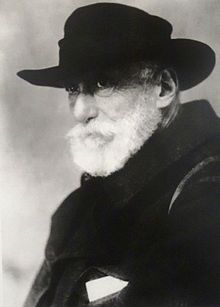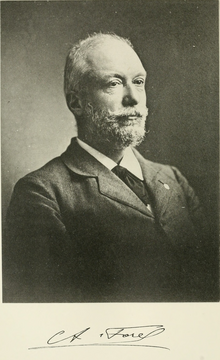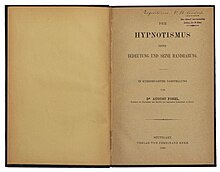Auguste Forel
Auguste-Henri Forel and August Forel (born September 1, 1848 at the country estate La Gracieuse in Morges , † July 27, 1931 in Yvorne ) was a Swiss psychiatrist , brain researcher , entomologist , philosopher and social reformer . He is considered the father of Swiss psychiatry and one of the most important representatives of the abstinence movement in Switzerland.
Life
From 1862 to 1866, his cousin François-Alphonse Forels graduated from high school in Lausanne . He then studied medicine at the University of Zurich from 1866 to 1871 . In 1871 Forel was a volunteer medical assistant in the Franco-German War .
In 1871 and 1872 he worked on his doctoral thesis on neuroanatomy with Theodor Meynert in Vienna . In 1872 he passed the state examination in Lausanne and received his doctorate in Zurich . From 1873 to 1878 he was an assistant doctor in Munich with Bernhard von Gudden , then Europe's leading brain researcher . In 1877 he obtained the license to teach at the Ludwig Maximilians University in Munich because of his studies of the hood region in the human brain .
From 1879 to 1898 he was Professor of Psychiatry at the University of Zurich and Director of the Psychiatric University Clinic Zurich (Burghölzli) , where he also met Carl and his brother Gerhart Hauptmann and gave them literary inspiration. In 1883 he married Emma Steinheil, the daughter of a colleague friend, the ant researcher Eduard Steinheil (1830–1878). His efforts to cure drunkenness led to the opening of the drinking sanctuary in Ellikon an der Thur in 1889 (since 1984 "Forel Clinic"). Zoological research trips took him to Algeria in 1893 and to South America in 1896 and 1899 .
At the age of fifty he resigned as director of Burghölzli and ended his career as a professor. From 1898 he devoted himself to his private studies in Chigny near Morges and from 1907 at the Fourmilière country estate in Yvorne. He signed the appeal to found the Monistenbund . Ernst Haeckel offered Forel to become its deputy president, possibly also president (letter of May 10, 1906).
Forel founded the International Association for Medical Psychology and Psychotherapy in 1909. In 1916 he became an active socialist as a member of the Social Democratic Party . In 1920 he joined the Baha'i religion (see letter to Forel ). Forel was also an internationalist , pacifist and advocate of the world bridge language Esperanto .
After Forel's death, he was honored in a memorandum of the German Monist Association from September / October 1931 "as a tireless, spirited fighter, scholar, free thinker, socialist, pacifist, opponent of the mass murderer alcohol (and) social reformer".
Act
Brain researcher
Under Gudden's direction, he helped improve the construction of the microtome that enabled Forel to produce the first complete series of 2,000 microscopic sections of the human brain in 1874. With this he created the basis for the new discontinuity theory and the neuron concept.
By comparing the results of the research methods of Guddens and Camillo Golgis , Forel discovered the neuron and thus founded the theory of neurons . The book Neuron Theory , published in 1887, was the culmination of his work as a brain anatomist.
Doctor and psychiatrist
As a brain researcher and psychiatrist Forel checked his biological research results for their connections for the human brain and soul and society. Like his teacher Meynert, he always emphasized the unity of brain and soul, with which he attracted attacks from the church. He was one of the first to recognize the importance of the new developments in psychology for the healing of the mentally ill. As early as 1887 he traveled to Nancy to study hypnotism with Hippolyte Bernheim . Against the resistance of the traditional medical profession, he helped suggestion therapy (hypnotism) achieve a breakthrough in conventional medicine. Psychiatry became a compulsory subject for medical studies.
As director of the Burghölzli, Forel was concerned with the welfare of the mentally ill, the prevention of mental illnesses and the protection of society. He developed modern work therapies for the mentally ill and introduced the term "reduced sanity" so that mentally ill criminals could be brought to a mental institution instead of a penal institution.
He also remained active as a private scholar and helped spread psychotherapy. His most famous students were his successor as director of the Burghölzli, Eugen Bleuler , Anton Delbrück , Adolf Meyer and the Zurich doctor and socialist activist Fritz Brupbacher .
Social reformer and pacifist

The many alcoholics in Burghölzli were a big problem. A member of the Blue Cross convinced Forel of the role model effect and importance of abstinence for healing. Forel, who had been used to daily alcohol consumption since he was a high school student in Lausanne, no longer drank alcohol. To treat alcoholics, he founded the first sanatorium for drinkers. As a socially committed doctor, however, he was not primarily interested in the treatment of sick people, but in the prevention of diseases. To prevent alcoholism, he founded the Swiss Order of Good Templars in 1892 and campaigned for alcohol-free inns.
In 1905 Forel published the sensational standard work The Sexual Question , in which he treated human sexuality for the first time in a holistic, scientific, psychological and sociological manner based on his many years of experience as a doctor. He advocated the removal of taboos from sexual life and equal rights for women because he was convinced that the well-being and happiness of humanity largely depended on the solution of the sexual question.
In May 1914, shortly before the beginning of World War I , Forel campaigned for a pacified world with the essay The United States of the World. He believed that, above all, through appropriate upbringing, accompanied by eugenics and other measures, the predatory nature of humans could be mitigated. Forel was in connection with the magazine La voix de l'Humanité - Die Menschheit , published weekly since 1914, twice a week since 1917, a total of 118 issues up to 1919, an organ of the Ligue pour la défense de l'humanité . It was a supplement to La libre pensée internationale and advocated the establishment of a society of nations , in the style of the later League of Nations .
Ant researcher
Forel's research on ants accompanied him all his life and found its expression in more than 250 writings on ants and other insects.
Forel began systematically observing ants at the age of seven. At the age of 25 Forel published the award-winning work Die Anmeisen der Schweiz . Charles Darwin expressed his admiration for the work in several letters.
The last great work by 72-year-old Forel Le monde social des fourmis depicts the social world of ants all over the world.
Eugenicists
A few quotes may characterize Forel's approach to eugenics :
“In the past, in the good old days, incompetent, inadequate people took shorter processes than they do today. An enormous number of pathological brains that (...) damaged society were briefly executed, hanged or beheaded, the process was short and successful insofar as people stopped multiplying and society with its degenerated germs stopped could contaminate. "
"However, the homogeneity of a breed has the advantage of making its peculiarities more permanent and characteristic, but these advantages are in turn offset by many disadvantages."
“In the case of mongrels, the father almost always belongs to the higher race, not the other way around. Very rarely does a white woman marry a Negro. "
Forel arranged the first castrations and sterilizations for Burghölzli patients in Europe for social reasons (there were precedents in the United States). At that time - effective and safe forms of contraception were not yet known, and abortion was a criminal offense - eugenics was considered the means of choice in most political parties to prevent the "degeneration" of the people. Forel was of the opinion that in those cases where reproduction should be prevented, sterilization was the lesser evil compared to permanent imprisonment. Since he thought castration was risky, he advocated sterilization since 1905. Under the threat of permanent incarceration, the victims of the “eugenically” motivated forced sterilization were often, but not always, required to give formal consent.
Forel's student Alfred Ploetz became one of the founders of racial hygiene in Germany . Another of his students, the Swiss Ernst Rüdin , became one of the leading racial hygienists in the Third Reich .
Based on the ideas of Forels (and other Swiss racial hygienists), a law on the sterilization of the mentally ill was passed in the canton of Vaud in 1928 (which was not repealed until 1985).
Regina Wecker , a Swiss professor of women's and gender history, stated: “It is difficult to 'classify' Forel: unlike most eugenicists, he belongs to the left-wing camp and in his social analysis explicitly combines racist ideas and theories with social views. In his main work, The Sexual Question (1904), he argues for the separation of sexuality and reproduction. He campaigned for equality between the sexes and for the better social position and social recognition of unmarried mothers. "
Forel was a staunch socialist and, for example, advocated such monstrous demands as the complete equality of the sexes, the recognition of female housework as equivalent to male professional work, the impunity of cohabitation and generally all consensual sexual acts among adults, including incest and all " Perversions ”as long as they do not violate the rights of others. In the case of homosexuality , he even regretted that marriage between men was forbidden. Forel also demanded the free availability of contraceptives, and he even wanted to allow abortion in cases of rape, endangerment of maternal health, mental illness and the like.
Forel was caught in many of the errors of his time and shared with it a strange imperialist attitude towards the "black" and "yellow" races. But he also signed appeals against anti-Semitism and against all racism in general , referring to the mixture in his own family.
Forel's book The sexual question was forbidden in the “Third Reich”. There is a report by the leading Nazi psychiatrist Matthias Heinrich Göring from 1938, which gives the reasons for the ban and in which Forel's statements on the racial question, the death penalty , homosexuality, equality, contraception, abortion and sterilization are classified as unacceptable.
family
In 1883 he married Emma Steinheil (1865–1946), a daughter of the engineer Eduard Steinheil . The couple had two sons and four daughters, including;
- Edouard (1884-1910)
- Inez (1885–1967) ∞ Hugh Brooke
- Marthe (1888–1948) ∞ Dr. Arthur Brauns († 1925)
- Oskar Luis (1891–1982), psychiatrist ∞ Leokadia Openik
- Daisy (1893-1953)
- Cécile (1896–1906)
Awards
In 1872 Forel received the Schläfli Prize from the Swiss Society for Natural Research for his book Die Anmeisen der Schweiz . In 1896 he received an honorary doctorate from the University of Zurich.
From April 4, 1978 to April 1, 1998 Auguste Forel was depicted on the Swiss 1000 banknote . On the back there were three ants and a vertical section through an anthill.
1932 in Vienna- favorites the August Forel alley named after him.
Awards named after Forel
The Auguste Forel Medal is the highest award of the abstinence organization IOGT Switzerland, which is given annually to one of its members for outstanding performance.
In addition, the Forel Clinic in Ellikon an der Thur awarded an August Forel Prize every two years from 2011 to 2015 to promote clinical and application-related projects in the field of alcohol, drug and tobacco addiction.
Fonts
- The memory and its abnormalities. Orell Füssli, Zurich 1885. ( archive.org )
- The hypnotism. Its meaning and its plot. In a brief presentation. Ferdinand Enke, Stuttgart 1889. ( archive.org )
- The hypnotism. Its psycho-physiological, medical, criminal significance and its handling. 2nd Edition. Ferdinand Enke, Stuttgart 1891. ( archive.org )
- The drinking habits. Their hygienic and social importance. Your relationships with academic youth. Ferdinand Enke, Stuttgart 1891. ( archive.org )
- Brain and soul. Lecture given at the 66th Assembly of German Naturalists and Physicians in Vienna on September 26, 1894. Emil Strauss, Bonn 1894. ( archive.org )
- Hypnotism and suggestive psychotherapy. Ferdinand Enke, Stuttgart 1888; 1902: ( archive.org )
- Hygiene of the nerves and the mind in a healthy and sick state. Ernst Heinrich Moritz, Stuttgart 1903; 1905: ( archive.org )
- About the sanity of normal people. Ernst Reinhardt, Munich 1902. ( archive.org ) Munich 1907. ( archive.org )
-
The sexual question. A scientific, psychological, hygienic and sociological study for the educated. Ernst Reinhardt, Munich 1907. ( archive.org )
- 14th edition, Munich 1923: The sexual question. A scientific, psychological and hygienic study along with attempted solutions to important social tasks of the future.
- Collected treatises on brain anatomy. With an essay on the tasks of neurobiology. Ernst Reinhardt, Munich 1907. ( archive.org )
- Crime and Constitutional Soul Abnormalities. The social plague of the unbalanced in relation to their diminished responsibility. Ernst Reinhardt, Munich 1907. ( archive.org )
- Ants from Guatemala etc., Paraguay and Argentina. In: German. Ent. Magazine. Nicolaische Verlags-Buchhandlung, Berlin 1909. ( archive.org )
-
The sensory life of insects. A collection of experimental and critical studies on insect psychology. Ernst Reinhardt, Munich 1910.
- 1st volume ( archive.org )
- 2nd volume ( archive.org )
- Les fourmis de la Suisse. La Chaux-de-Fonds 1920.
- Small philosophy for everyone. Translation by Paul Chr. Plottke, Verlag Kaden Dresden 1928 (French original edition published 1924)
literature
- Mirjam Bugmann: Hypnosis Politics. The psychiatrist August Forel, the brain and society (1870–1920). Böhlau, Cologne 2015, ISBN 978-3-412-22446-2 (also dissertation, University of Zurich, 2011).
- Erich Fromm : A. Forel review: Review of my life. In: Journal for Social Research . Volume 4 (1935), pp. 112-114.
- Serina Heinen: Between the theory of evolution and the religion of mankind - The Swiss monist, Baha'i and eugenicist Auguste Forel. In: The Principle of Evolution. Darwin and the consequences for the theory of religion and philosophy. Edited by Mariano Delgado, Oliver Krüger, Guido Vergauwen. W. Kohlhammer, Stuttgart 2010, ISBN 978-3-17-021501-6 .
- Thomas Huonker : Diagnosis “morally defective”. Castration, sterilization and racial hygiene in the service of Swiss social policy and psychiatry 1890–1970. Orell Füssli, Zurich 2003, ISBN 3-280-06003-6 .
- Anton Leist (Ed.): Auguste Forel: Eugenics and memory culture. VDF Hochschulverlag, Zurich 2006, ISBN 3-7281-3047-8 .
- Rolf Meier: August Forel 1848–1931: doctor, natural scientist, social reformer. An exhibition by the University of Zurich, autumn 1986. University of Zurich, Zurich 1986.
- Alexander von Muralt : Auguste Forel. Orell Füssli, Zurich [1928].
- Volkmar Sigusch : History of Sexology. Campus, Frankfurt am Main 2008, ISBN 978-3-593-38575-4 .
- Volkmar Sigusch, Günter Grau (Ed.): Personal Lexicon of Sexual Research. Campus, Frankfurt am Main 2009, ISBN 978-3-593-39049-9 .
- Hasso Spode : Auguste Forel. In: Jack S. Blocker et al. (Ed.): Alcohol and Temperance in History. ABC Clio, Santa Barbara 2003.
- Annemarie Wettley : August Forel. A doctor's life in the conflict of his time. Otto Müller Verlag, Salzburg 1953.
- Annemarie Wettley: Forel, August. In: New German Biography (NDB). Volume 5, Duncker & Humblot, Berlin 1961, ISBN 3-428-00186-9 , p. 298 f. ( Digitized version ).
- Willi Wottreng : Brain tear: How the mad doctors Auguste Forel and Eugen Bleuler wanted to save the human race. Weltwoche-Verlag Zurich, 1999, ISBN 3-85504-177-6 .
Web links
- Literature by and about Auguste Forel in the catalog of the German National Library
- Works by and about Auguste Forel in the German Digital Library
- Newspaper article about Auguste Forel in the 20th century press kit of the ZBW - Leibniz Information Center for Economics .
- Works by and about Auguste Forel in the catalog of the Swiss National Library
- Vera Koelbing-Waldis: Forel, Auguste. In: Historical Lexicon of Switzerland .
- Burkhart Brückner, Ansgar Fabri: Biography of Auguste Henri Forel , Biographical Archive of Psychiatry (BIAPSY)
- Overview of the courses held by Auguste Forel at the University of Zurich (winter semester 1879 to winter semester 1897)
- August Forels Fall , Kulturplatz, Swiss television , October 12, 2005
Individual evidence
- ↑ Auguste Forel: Hygiene of the nerves and the mind. In: Library of Health Care. Volume 9, published by Ernst Heinrich Moritz, Stuttgart 1903, pp. 186–187.
- ↑ Auguste Forel: The sexual question. E. Reinhardt, 1907, p. 45.
- ↑ Auguste Forel: The sexual question. E. Reinhardt, 1907, p. 175.
- ^ Regina Wecker : Psychiatry - Eugenics - Gender. In: Swiss Archive for Neurology and Psychiatry . Volume 154 (May 2003), p. 226, footnote 5.
- ↑ Erwin J. Haeberle : Auguste Forel - the first Swiss sexologist. In: Neue Zürcher Zeitung. February 19, 1986.
| personal data | |
|---|---|
| SURNAME | Forel, Auguste |
| ALTERNATIVE NAMES | Forel, Auguste Henri; Forel, August |
| BRIEF DESCRIPTION | Swiss psychiatrist and entomologist |
| DATE OF BIRTH | September 1, 1848 |
| PLACE OF BIRTH | La Gracieuse, Morges |
| DATE OF DEATH | July 27, 1931 |
| Place of death | Yvorne |






